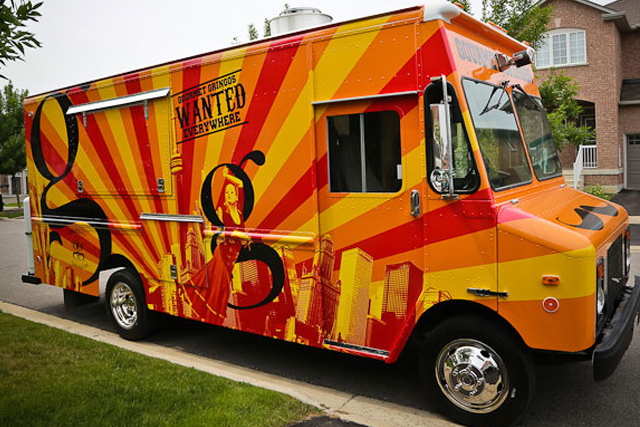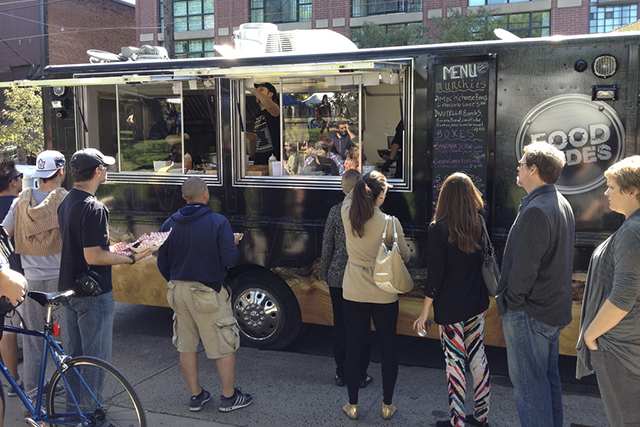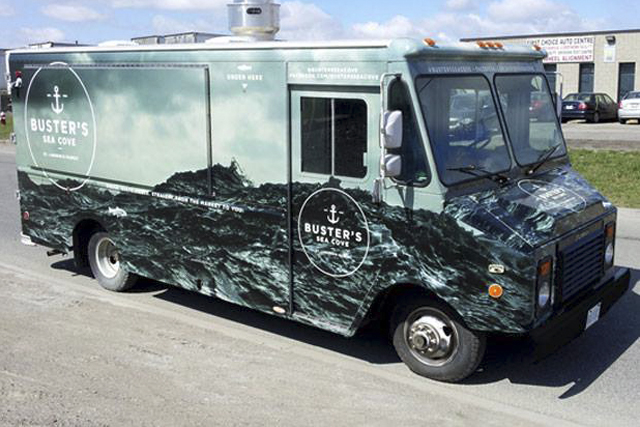Food truck operators across Toronto will be serving from downtown curbsides (in theory) for the first time this summer, but restrictions are souring the otherwise sweet occasion. The final city council vote on the new food truck bylaws took place on April 3rd. The results largely fell short of operators’ expectations.
“We didn’t get exactly what we were lobbying for,” says Krystian Catala, owner of the Gourmet Gringos food truck and an expanding list of brick-and-mortar locations. “The fact that we can use parking lots is a great advantage, but the 50m thing is a way of cancelling out the chance of doing any vending downtown.” (You can see a map of the food truck restriction zones here.)
ADVERTISEMENT |
The approved bylaws will allow food trucks to park in pay-and-display parking spaces for a maximum of three hours, with a cap of two trucks per block. No trucks will be allowed to park within 50m of any existing restaurant, however.
“The problem with the 3 hour parking rule is the need to have a working prep kitchen,” Catala continues. “We’re lucky as restaurant owners, but if you’re not it’s nearly impossible to prep, cook and sell all within that time limit. And a commissary kitchen will not fit the scheduling restrictions for many vendors.”
Given the proximity limitations and the short parking times, the serviceable areas in the downtown core will be scarce. A total of 125 permits are being issued to food truck operators for the 2014 vending season (there are already 27), making competition for choice spots another contentious topic.
ADVERTISEMENT |
“First of all, they need to make it clear to us what defines a restaurant,” says Tom Antonarakis, owner of Buster’s Sea Cove. “Is Starbucks a restaurant, for example? This will be a prototype year. Hopefully next year they’ll look at things again and see that 3 hours isn’t enough.”
Council members and local BIAs have contended that the limitations are in the best interests of existing business owners. The $5,067 annual permit fee for food trucks will balance out the property tax that restaurant owners must pay. The parking constraints will ensure that food trucks aren’t stealing their customers.
As a restaurant owner himself, Catala sees things differently, however. “If people are out to go to a food truck they’ve made their minds up. They’re not going to sit down at a restaurant,” he says. “More importantly, once council sees the lineups at these parking lots, hopefully they’ll understand that people are visiting these areas in new ways – it will actually help businesses thrive and flourish in these areas.”
The challenges will continue for the upcoming vending season – one that will likely be a short one according to Antonarakis. Despite the shortcomings of the new bylaws, it’s important to recognize that progress has been made.
ADVERTISEMENT |
“It’s always been an uphill battle with food trucks,” Antonarakis dejectedly admits. “I guess we’ll just have to work our way forward in small steps.”
What are your thoughts on the new food truck bylaws? Let us know in the comments below or tweet us @ViewTheVibe.
ADVERTISEMENT |








